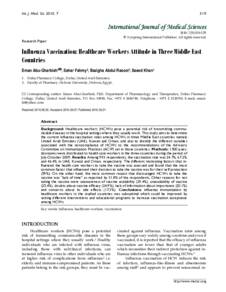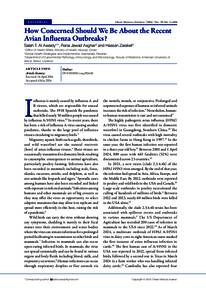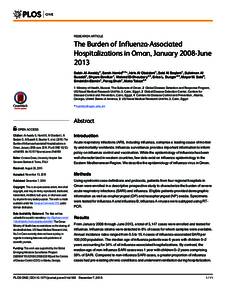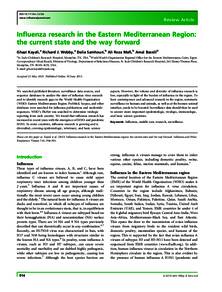وثيقة
Influenza vaccination : healthcare workers attitude in three Middle East countries.
المعرف
DOI: 10.7150/ijms.7.319
المساهمون
الناشر
Ivyspring International Publisher.
ميلادي
2010-09
اللغة
الأنجليزية
الملخص الإنجليزي
Background: Healthcare workers (HCWs) pose a potential risk of transmitting communicable diseases in the hospital settings where they usually work. Thist udy ai ms t o det er mi ne the current influenza vaccination rates among HCWs in three Middle East countries namely United Arab Emirates (UAE), Kuwait and Oman, and also to identify the different variables associated with the noncompliance of HCWs to the recommendations of the Advisory Committee on Immunization Practices (ACIP) set in those countries. Methods: 1500 questionnaires were distributed to health care workers in the three countries during the period of July-October 2009. Results: Among 993 respondents, the vaccination rate was 24.7%, 67.2% and 46.4% in UAE, Kuwait and Oman, respectively. The different motivating factors that influenced the health care workers to take the vaccine was assessed and found that the most common factor that influenced their decision to take the vaccine was for their self protection (59%). On the other hand, the most common reason that discouraged HCWs to take the vaccine was "lack of time" as reported by 31.8% of the respondents. Other reasons for not taking the vaccine were unawareness of vaccine availability (29.4%), unavailability of vaccine (25.4%), doubts about vaccine efficacy (24.9%), lack of information about importance (20.1%) and concerns about its side effects (17.3%). Conclusions: influenza immunization by healthcare workers in the studied countries was suboptimal which could be improved by setting different interventions and educational programs to increase vaccination acceptance among HCWs.
المجموعة
ISSN
1449-1907
URL المصدر
قالب العنصر
مقالات الدوريات




